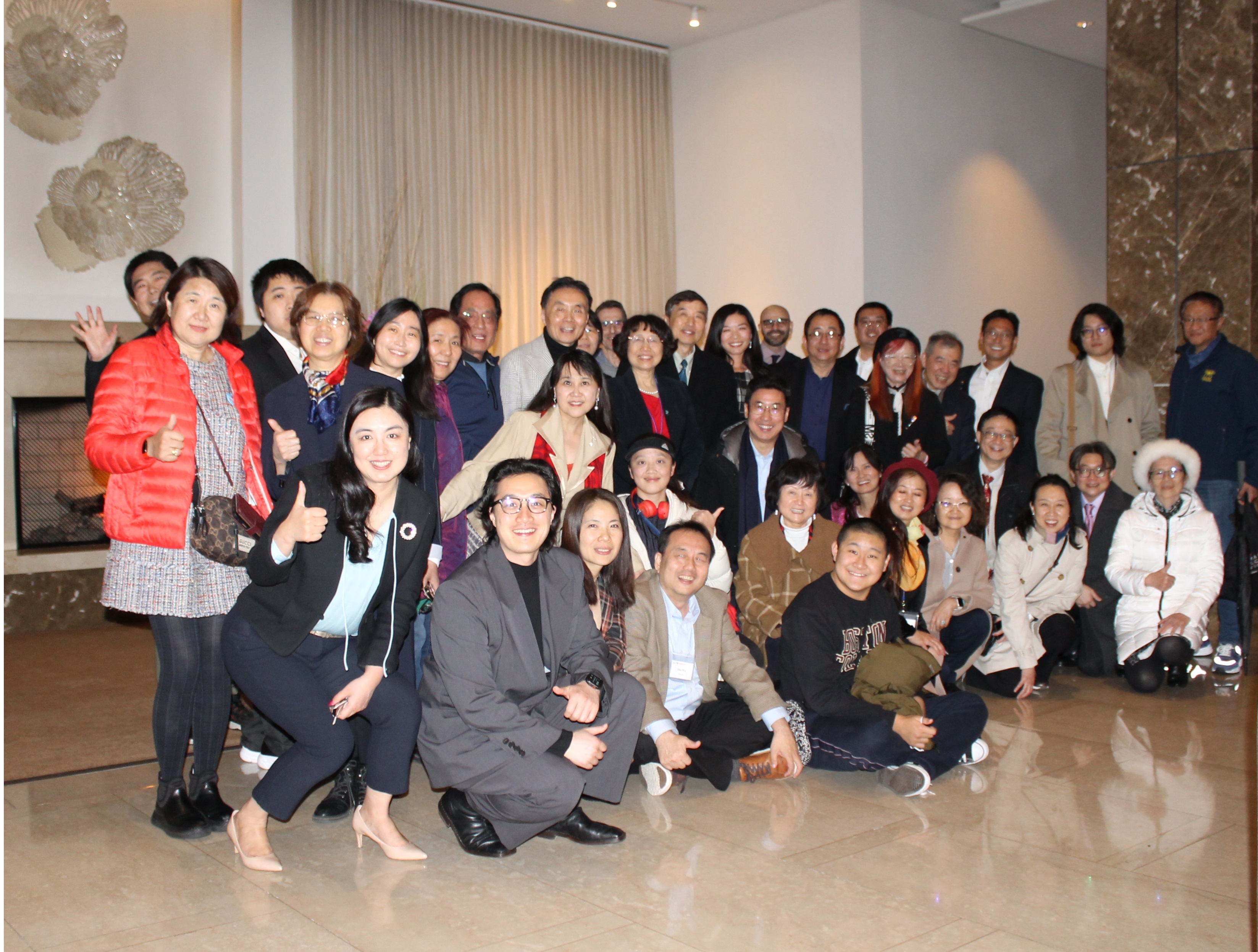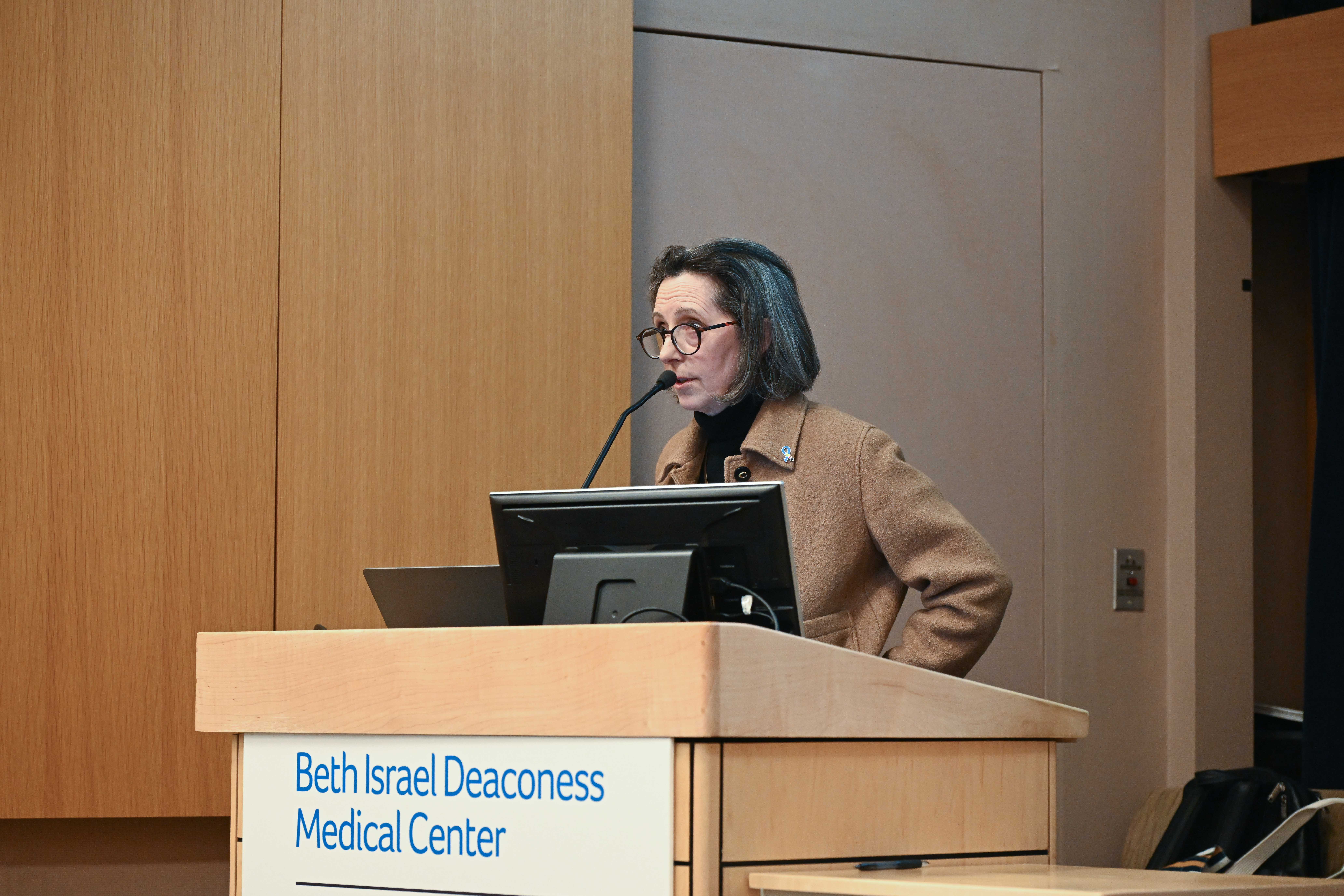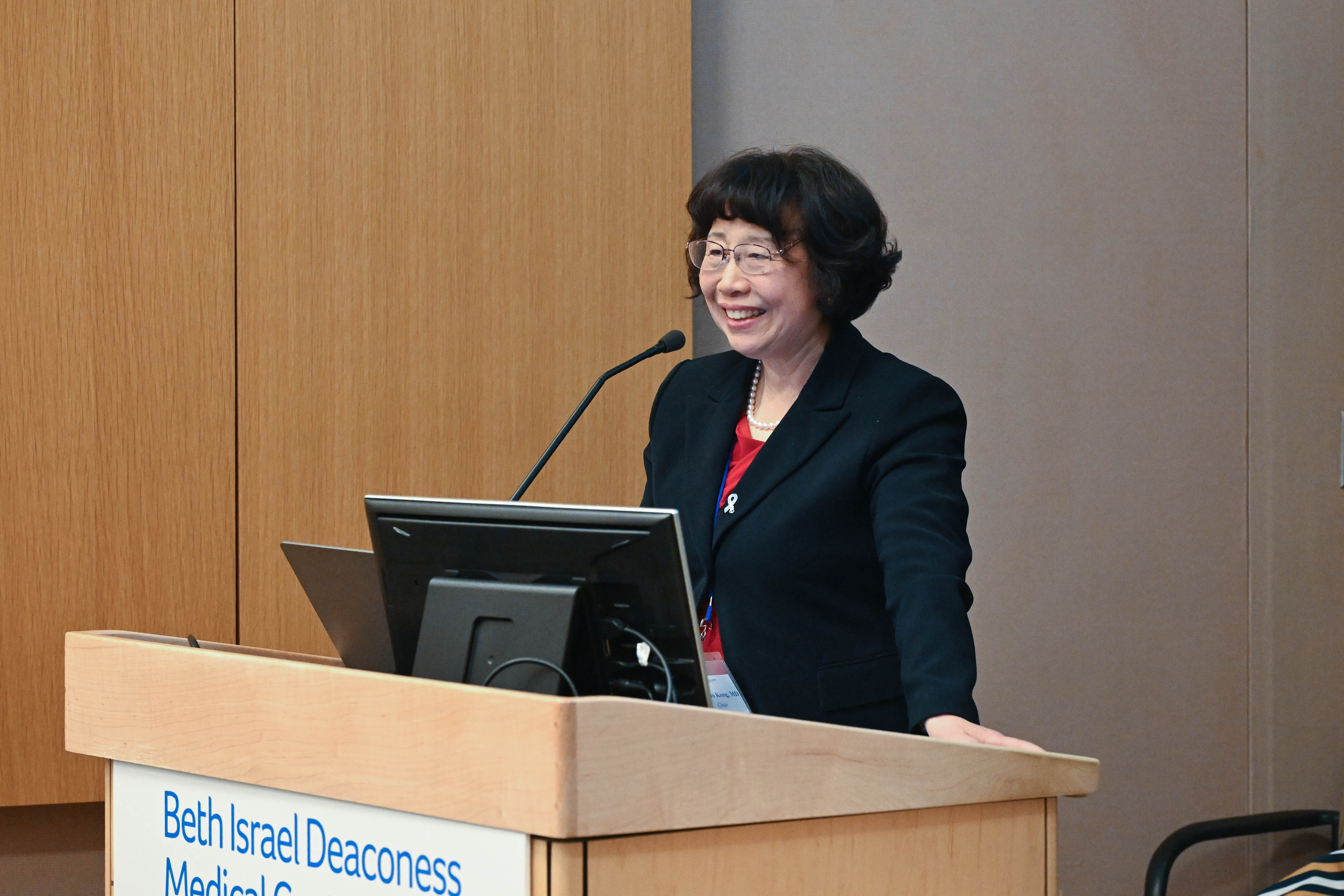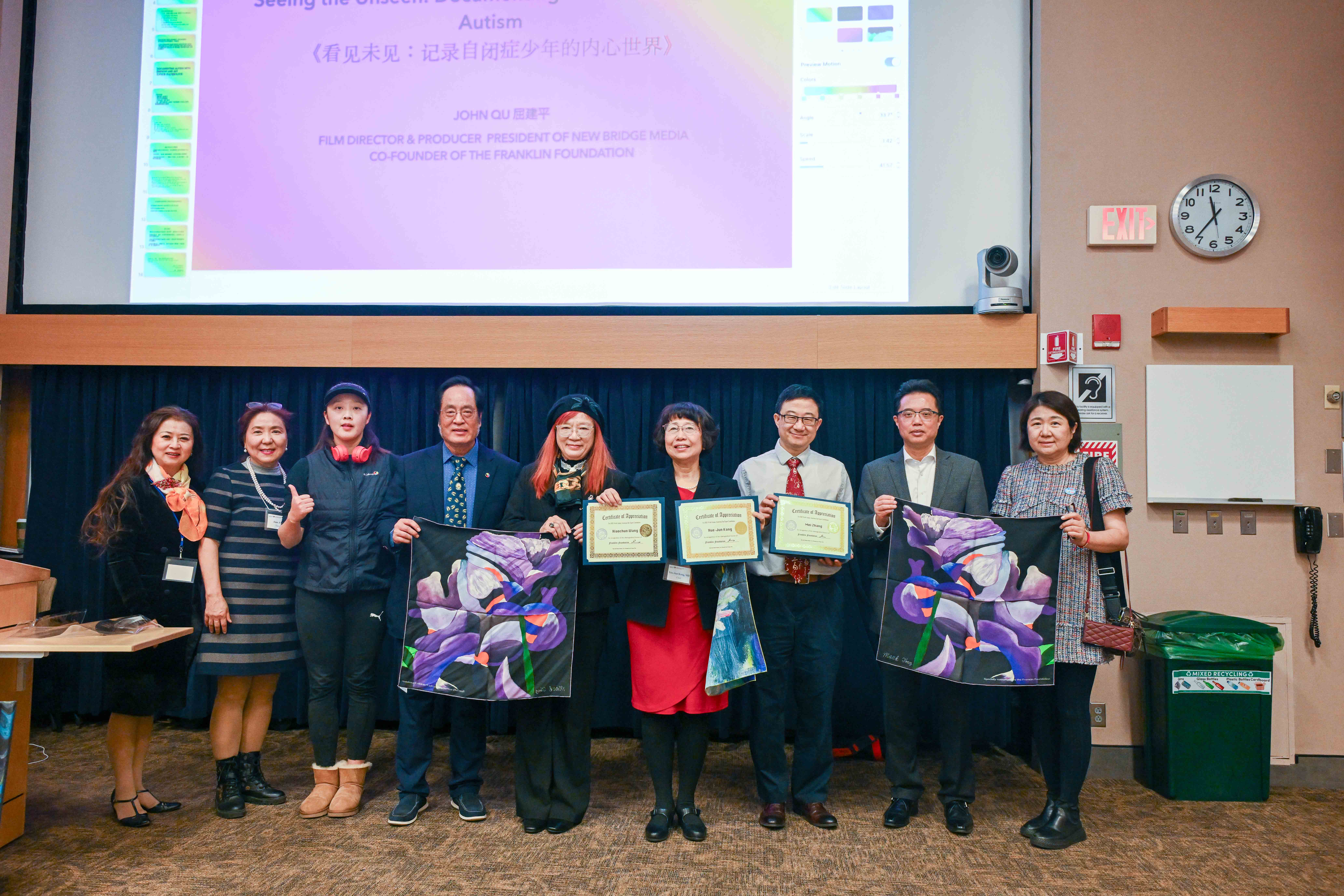2025.04.05 ACMES Co-Organized Autism Awareness Symposium in BIDMC
April, a month when spring quietly reawakens the earth, is globally recognized as Autism Awareness Month. Over the weekend of April 5–6, 2025, the Autism Awareness Symposium was held with solemn grace at the Sherman Auditorium of Beth Israel Deaconess Medical Center (BIDMC), a teaching hospital affiliated with Harvard Medical School. Amid Boston’s persistent spring rain, the two-day gathering came to a fulfilling close.
Despite inclement weather and overlapping commitments elsewhere in the city, the symposium welcomed over a hundred in-person attendees—some traveling from afar, including New York, California, South Carolina, and Taiwan—alongside a robust online audience who joined from across the globe.
The symposium’s speaker roster was composed of over a dozen distinguished voices, including Harvard-affiliated clinicians, researchers, psychologists, a documentary filmmaker from California, an award-winning film director from New York, a behavioral therapist, as well as legal and financial experts specializing in special needs planning. The agenda interwove academic lectures, heartfelt personal stories, film screenings, and an art exhibition, forming a multidimensional, intellectually and emotionally rich experience.
Dr. David Hirsh, Associate Dean, Harvard Medical School, opened the conference with welcome remarks. This was followed by a keynote presentation from Dr. Ann M. Neumeyer, Medical Director at the Lurie Center of Massachusetts General Hospital, entitled “Autism: Myths and Evidence.” Her talk addressed gender differences, pain perception, bone density, the fever effect, and ongoing scientific developments that challenge and clarify long-standing assumptions.
Dr. Xue-Jun (June) Kong, symposium chair and host, and Director of the Synapse Laboratory at Massachusetts General Hospital and Boston Children’s Hospital, attending physician of BIDMC, delivered a lecture titled “New Individualized Approaches to Autism.” She surveyed current progress in autism-related biomarkers—including genetics, microbiota, eye-tracking, EEG, imaging, and AI—and mapped out emerging therapeutic directions and targets. Her talk also emphasized strength-based education and advocated for integrated healthcare–education models that empower autistic individuals through customized pathways. Her presentation and moderation were insightful and inspiring for the audience.
Dr. Walid Yassin, co-chair of symposium, and psychiatry researcher, presented a thought-provoking address on neurodiversity, encouraging a broader understanding of cognitive variance and its value in society.
The event was graciously hosted by BIDMC, with the American Chinese Medical Exchange Society (ACMES) serving as the primary organizer. Key organizers and session moderators included Drs. Weigen Li, Zhao Liu, Qiaoxin Yang, Wei Yang, Bo Wang, Yiqing Song, and Xiaochun Wang, along with several physician volunteers who contributed with precision and care. Co-organizer Silk Road Center was represented by Liying Wu, who played a leading role in food service.
Among the symposium’s co-organizers was the Franklin Foundation. Its founder and director, Jianping Qu, screened his moving documentary The Whisper of Colour, chronicling the journey of Sophia, a young woman with autism whose exceptional artistic talent was discovered and nurtured, culminating in her being signed as a professional artist on her 18th birthday. The 40-minute film touched many. Jingxiu He, president of the foundation, shared the success of a recent autism art exhibition held in Los Angeles.
Dr. Jason Li, chair of the Boston Future Academy as co-organizer, and co-chair of the American International Education Alliance, delivered a powerful speech titled “Raising Awareness of Special Education,” providing insight into both the core definition and the broader implications of special education. The Autism Art Foundation also supported the symposium.
Later that afternoon, financial advisor and certified public accountant Ms. Jinping Xu gave a practical lecture on financial planning for families with special needs, covering healthcare insurance and tax considerations. Dr. Jian Kong, from Massachusetts General Hospital, presented on the design and implementation of parent–child training programs rooted in mind–body medicine. Bai Pan, a behavioral therapist from New York, shared her recent research into performance-based structured interviews and emergency response analyses as a foundation for skill-based, socially meaningful interventions.
Amber Huang, a senior in the film department at NYU’s Tisch School of the Arts, presented her short film Glass, which explored the unique emotional experiences of siblings in families affected by autism. The heartfelt storytelling struck a chord with the audience, and the film was awarded Best Student Director at the Seattle Film Festival. Another NYU graduate student, Wenrui Chen, screened her documentary Raymond the Math Prodigy, a compelling portrait of Raymond K. Wang’s extraordinary mathematical gifts, which drew widespread admiration.
Yin-Chun Chen from the Taiwan Autism Art Association and Yung-Chi Sung of Yuanzhi Education co-presented on the transformative impact of art therapy in autism, emphasizing how artistic expression can help unlock emotional and developmental growth in individuals on the spectrum. Legal scholar Liyun Zhang then gave a comprehensive presentation on trust structures for special needs families, as well as legal guidance on the establishment of autism-related nonprofit institutions.
Director Qi Li and producer Lu Lai, representing the Youth Journalism Team, attended the event to conduct interviews and document proceedings, capturing many touching moments firsthand.
The second day of the symposium began with a keynote by Dr. William Stone, clinical neuropsychologist at BIDMC. His lecture, “Autism: Cognition, Concept, and Diagnosis,” was warmly received for its humor, clarity, and profound insight into the interplay between diagnostic systems and cognitive theory.
This was followed by moving testimonies from two young autistic individuals. Raymond K. Wang, from the Boston area, shared his deeply personal journey—how he overcame the challenges of severe childhood autism to become a university graduate, a math teacher, and a research assistant at Massachusetts General Hospital, he invented a new eye tracking parameter system and model to differentiate autism from non-autism, which led a patent filing via MGH, this technology has been industrialized last year. He also showcased his talents in music and visual art, bringing many in the audience to tears. One emotional attendee could barely voice their question through tears.
Next came Yi-Hong Chen, a graduate student in special education from Taiwan who was born with multiple developmental impairments and an unsteady gait. He spoke with grace and composure, proudly sharing his paintings and revealing that he now has a girlfriend from mainland China, drawing applause from the audience.
Hung-Hsuan Chen, a man in his thirties with Marfan syndrome, scoliosis, profound myopia, and almost no spoken language, then took the stage. Under the guidance of his father and teacher, he has developed a stunning body of artwork. Watching him draw live on stage moved the audience deeply—his work defied assumptions and left an indelible impression.
Finally, Dr. Mei Zhang delivered a speech titled “Autistic Intelligence and Artificial Intelligence: A Path to Understanding,” presenting original insights that sparked active discussion among the audience. He introduced the concept of “Autistic Intelligence (AI1),” emphasizing its complementarity with Artificial Intelligence (AI) as a new framework for understanding cognitive diversity. He noted that AI tools—such as ChatGPT, DeepSeek, and customized large language models (LLMs)—can serve as powerful aids in decoding and interpreting neurodiverse expressions. Using well-known historical figures as examples, he proposed a structured, layered method for analyzing their cognitive capabilities and functions with the help of AI. The aim, he stressed, is not to label them, but to better understand their cognitive characteristics and thought patterns. His core goal is to broaden the boundaries of how we understand cognitive differences, allowing society to re-examine autism with greater nuance, learn from its associated intelligence, creativity, and uniqueness, and offer more thoughtful support to individuals.
Throughout the two days, an art exhibition featuring works by autistic artists from Boston, California, and Taiwan was displayed in the outer halls of the venue. The artworks, rich in form and color, conveyed a silent brilliance that resonated deeply with viewers. Many attendees lingered long after scheduled sessions, captivated by the expressive power and quiet intensity of the art, offering unending praise.
In the evening, the organizers hosted a banquet and roundtable discussion at the InterContinental Hotel in Boston. Along an elegantly arranged, elongated table, speakers and guests sat side by side—not merely sharing experiences but exchanging insights with candor and warmth. A spring-like gentleness seemed to ripple through the dining hall, as if each voice found its place among others with ease and grace.
The symposium concluded with a heartfelt call to action from Dr. Xue-Jun (June) Kong. In her closing remarks, she urged society at large to embrace autistic individuals not with pity, but with genuine understanding, support, and admiration. “We must learn to see not only the differences,” she said, “but also the talents and admirable qualities that reside within them. Let us celebrate neurodiversity, foster a society of inclusion and compassion, and support every autistic individual in realizing their potential—not as a burden, but as a valuable contributor to our world. They deserve, as we all do, to experience the fullness of life.”
提高自闭症意识研讨会于哈佛贝斯以色列女执事医疗中心圆满举行
每年四月为全球自闭症意识月。在刚刚过去的周末(2025年4月5日至6日),为期两天的“提高自闭症意识研讨会”在哈佛医学院附属贝斯以色列女执事医疗中心(Beth Israel Deaconess Medical Center, BIDMC)谢尔曼礼堂隆重举行,并于春雨潇潇中圆满落幕。尽管波士顿阴雨绵绵,且与其他重要活动时间重叠,仍有百余位现场参会者不远千里而来,来自波士顿本地、纽约、加州、南卡罗来纳、台湾等地,同时也有众多线上观众积极参与。
十余位演讲嘉宾阵容强大,涵盖哈佛医学院著名自闭症临床专家、研究人员、心理学家,以及来自加州的自闭症纪录片导演、纽约的行为治疗师、获奖微电影导演,还有专为特需家庭服务的信托律师、财务规划师与注册会计师。研讨会内容丰富多元,既有前沿学术讲座,也有深情动人的个案分享,更穿插自闭症主题纪录片、微电影放映与画展展出,形式交织,动静相宜。
会议伊始,由哈佛医学院副院长David Hirsh医师致开幕辞,接续由麻省总医院Lurie中心医务主任Ann M. Neumeyer医师发表题为《自闭症的神话与实证》的演讲,深入探讨自闭症在性别、痛觉、骨质、发烧等方面的科学研究与现实观察之间的差异与联系。大会主席、麻省总医院与波士顿儿童医院Synapse研究室主任,BIDMC内科孔学君医师,则带来了《自闭症的新型个体化方案》讲演,聚焦基因、微生物组、眼动追踪、脑电图、影像及人工智能生物标志物等多维指标,勾勒出个体化精准治疗的可能路径,并强调以优势为导向的教育介入与医教结合模式的推广潜力。她的演讲和主持富有洞察力和启发性。
大会共同主席、精神医学博士Walid Yassin则围绕“神经多样性”的议题,发表深刻见解,引人深思。此次大会由哈佛医学院附属BIDMC担任东道主,美中医学交流协会为主办方,协会骨干李伟根、刘昭、杨乔新、杨薇、王博、宋一青、王晓春博士等,以及众多医生成员担纲主持与组织工作,尽显专业风范。协办单位北美敦煌文化亦鼎力支持,由武丽英女士担任团队协调。
本次大会的共同主办方之一富兰克林基金会创始人屈建平导演现场播放其执导的感人纪录片《颜色的细语》,讲述一位名叫Sophia的自闭症青年如何被发现其非凡绘画天赋,并在18岁生日之际成为签约画家的感人历程,片长40分钟,令人动容。基金会主席赫景秀女士亦介绍了洛杉矶自闭症画展的举办盛况。另一共同主办单位波士顿未来学院与美国国际教育联盟共同主席李健生博士,发表《提高特殊教育意识》的讲演,深入阐释特殊教育的内容与广义外延。协办单位自闭症艺术基金会亦积极参与支持。
当日下午,注册会计师与理财专家徐晋平女士就“特需家庭财务规划”展开专题讲座,涵盖自闭症孩子的医疗保险、税务申报等实际关切议题。随后,麻省总医院孔建教授介绍了其在亲子培训中引入心身医学的课程设计与实践成果。来自纽约的行为治疗师潘柏女士,分享了其基于绩效分析方法的研究成果,展现综合应急分析在技能导向干预中的实用价值与社会意义。
纽约大学电影学院导演系大四高材生黄羽婕(Amber Huang)展示其执导的微电影《玻璃》,描述一位自闭症者的兄弟姐妹所经历的独特家庭挑战,作品情感真挚,打动人心,荣获西雅图电影节最佳学生导演奖;另一位NYU研究生陈文蕊拍摄的短片《Raymond的数学奇才》,展现主角王睿萌令人震撼的数学天赋,引发现场热烈反响。
台湾自闭症艺术协会陈颖君女士与远志教育宋永麒博士则就“艺术治疗带来的疗效”联合讲演,强调艺术表达在促进自闭症者内在发展中的重要作用。张瓅允法学博士随后介绍了特需家庭信托架构及自闭症相关非营利机构设立的法律条款与实务细节,为家庭提供专业指引。青年记者团成员黎棋导演与赖璐制片人亲临会场采访,为活动记录珍贵影像。
大会第二天由贝斯以色列女执事医学中心临床神经心理学专家William Stone教授发表主题讲演《自闭症的认知结构、概念与诊断之间的关系》,语言风趣幽默,深入浅出,广受好评。自闭症不是单一症状,而是一种认知结构的变异,其核心特征是认知与行为的僵化。 “流动性智力”(fluid intelligence)与“结晶性智力”(crystallized intelligence)构成了理解人类思维的双支柱,而自闭症群体常在这两者的平衡上呈现出显著差异。通过识别和支持不同类型的认知结构,我们可以更好地理解自闭型思维,并为其发展路径提供多样化的社会与教育支撑。
接续有两位自闭症青年的真实分享。其一是来自波士顿的王睿萌(硕士生),他讲述自己从重度自闭症儿童成长为即将研究生毕业的青年,从担任数学教师到在麻省总院科研期间作为主要发明人创立了新的眼动指标体系及模型,通过麻省总医院注册了专利,专利产品已经工业化。他的人生经历鼓舞人心。睿萌还展示了唱歌,音乐演奏,与绘画才艺,他的坦率与开朗性格,都令在场听众动容而开怀。
另一位分享者是来自台湾的陈奕宏(硕士生),自幼多项发育迟缓,步态不稳,如今已在攻读特殊教育硕士学位,其绘画亦极具个人风格,并学会了令人瞩目的少林拳。他彬彬有礼,现场坦言已有一位来自大陆的女友,引发会场一片掌声。随后,重度残疾自闭症者陈泓亘登台,他患有马凡氏症候群、严重脊柱侧弯与高度近视,几乎无法言语。但在父亲与陈老师引导下,其绘画作品震撼全场,观众目睹创作过程,感动难以言表。他在会议过程中,还在休息时间了解BIDMC和波士顿地铁的复杂方位,快乐地帮助长者,令人感动和欣慰。
最后,张眉博士发表了题为《自闭症智能与人工智能:通向理解之路》的讲演,提出了富有原创性的见解,激发了在场听众的热烈讨论。他提出“自闭型智能(AI1)”这一概念,强调它与人工智能(AI)之间的互补关系,AI工具——如ChatGPT、DeepSeek,以及定制化的大型语言模型(LLMs)——可以成为解码和诠释神经多样性表达的有力助手,通过AI辅助,以结构化、分层的方式分析其认知能力与功能模式,更深入地理解其认知特征与思维路径,并为个体提供更具思考力的支持。
会议期间,自闭症人士的天赋禀异的艺术作品在会场外集中展出,汇聚来自波士顿、加州与台湾等地的佳作,形式多样,色彩丰富,展现出自闭症群体沉默却绚烂的内心世界,参观者纷纷驻足,赞不绝口。
夜间,主办方在波士顿洲际酒店设晚宴与圆桌讨论,讲者与与会者共聚一堂,畅谈经验、交流理念,气氛热烈而温馨。两日研讨会可谓群贤毕至,内容充实、视野宏阔,获得线上线下广泛好评,不少与会者表示“深受启发,收获良多”。
大会总结时,孔学君医师发出真挚呼吁:“全社会应以理解、接纳与支持的姿态面对自闭症人群,看到他们的不同,也看到他们所拥有的才能与值得学习的品质。愿我们共同拥抱神经多样性,打造包容、关爱的社会环境,让自闭症者得以充分发挥其潜力,为社会作出贡献,而非被视为负担,亦能与我们一样,共享生活的美好。”
[Reported on April 7th, 2025, 2025年4月7日 ]








